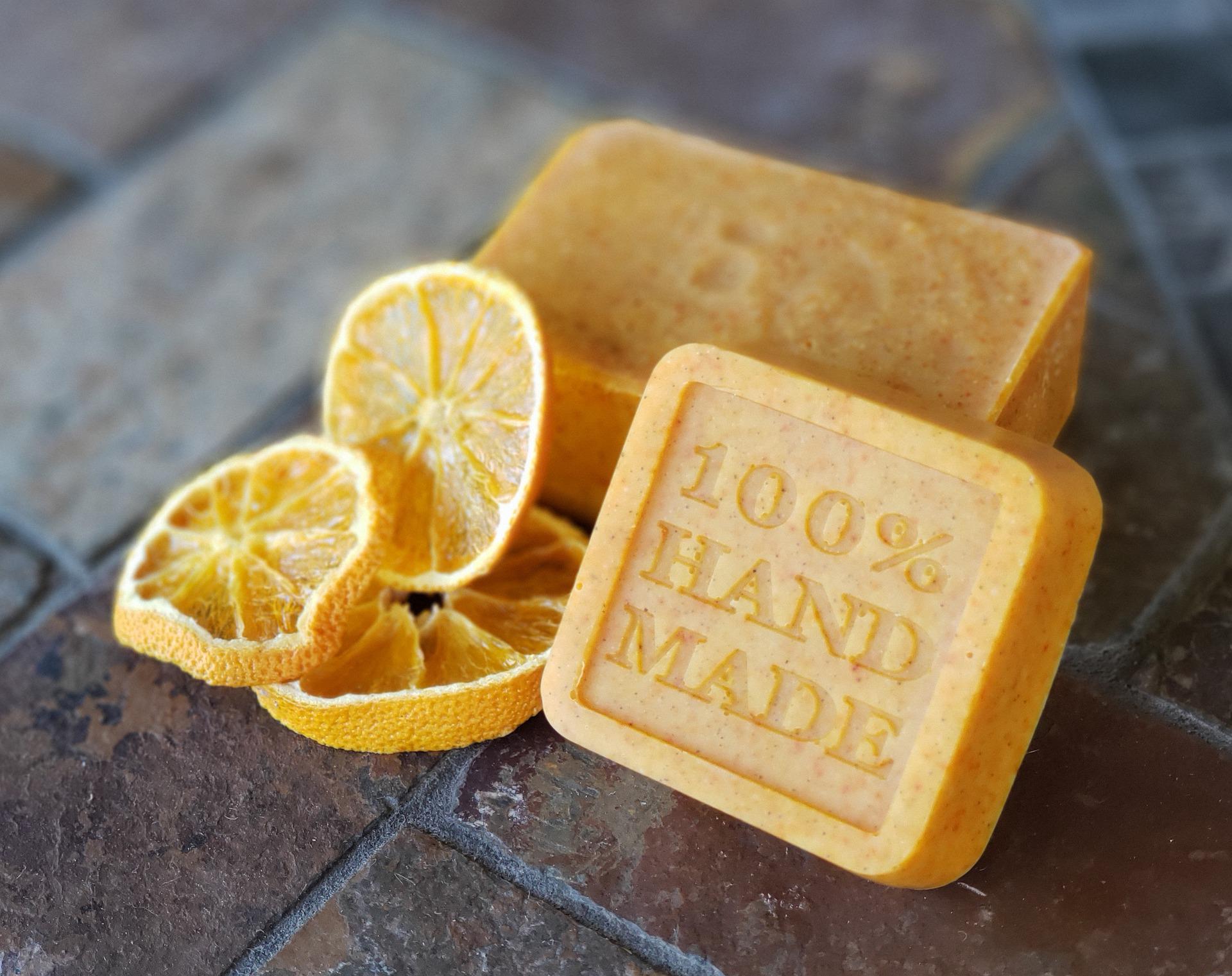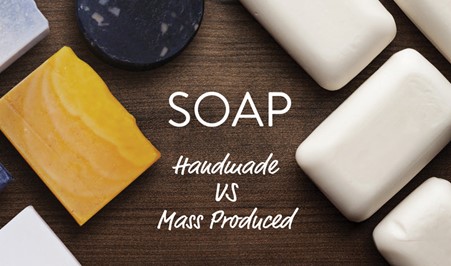Potential Health Benefits of Using All-Natural Soap
Let’s explore the world of natural soap and see if the benefits it offers are worth the added cost.
Modern science has proven what was already assumed through common sense: toxins from our environment are, in large part, absorbed through our skin.
As the largest organ in the human body, and the one most in contact with the outside world, what we put in contact with our skin should be a major concern for us.
Soap, since it is purposely rubbed on our skin – all over our skin in fact – should be of primary concern when we consider this reality. Once we take due care in the water we drink and the food we eat, what we expose our skin to, should be the top priority when it comes to physical health.
One way to reduce exposure to potentially harmful toxins is to use an organic, natural soap.
What is natural soap?
Natural soaps start with natural ingredients. Organic soaps use organic natural ingredients. Organic soaps normally consist of blended butter and oils derived from various plants. This substance is rich in vitamins, nutrients, and antioxidants. Human skin, hair and other parts of the body need these substances to grow, live and/or remain healthy. Many natural soaps have other beneficial ingredients added as well, such as clays, salts, essential oils and botanical extracts.
Handmade soaps take longer to produce, and usually use higher quality ingredients, hence the added cost, but they do tend to be easier on sensitive skin.
It is important to try a variety or natural soaps to find the one that is ideal to your skin type and preferences.
There are several benefits to using natural soap, including:
Real Soap Instead of “Fake Soap”
Many products that are advertised or displayed using terms like ‘cleanser,’ ‘body bar,’ ‘body wash,’ ‘beauty bar,’ ‘skincare bar,’ and even ‘deodorant soap’ are actually detergent based products, and not really soaps at all.
Natural Soap is Highly Moisturising
One of the benefits of using real soap is that one of the by-products of the production process is glycerine. Glycerine is an excellent skin moisturise.
because it attracts moisture to itself in and around the skin. Traditionally made soaps contain glycerine, and so they hydrate the skin during bathing, whereas many commercially manufactured soaps can dry skin out. Why? Because store-bought, commercial soaps usually undergo a process designed specifically to remove the glycerine.
Instead of leaving glycerine in the soap to benefit your skin, it is extracted and used in other products, such as moisturisers and similar skincare products – which you will need more of if you use their soap, since it has had the glycerine removed. Soap devoid of glycerine can leave skin dry, ashy, itchy and looking far from its best.
Handmade soap, however, traditionally made to retain its glycerine content, will leave your skin more moisturised and healthy-looking.
Better Ingredients Used
When a company manufactures hundreds of thousands, or even millions of bars of soap at a time, part of the profit margin is gained from mass production, and part is gained from using the cheapest products available – and these are often synthetic substitutes for the real thing.
Many believe that these synthetic products can sometimes be damaging to the endocrine, reproductive, respiratory, and immune systems – not to mention the potential damage they do by drying out your skin.
Commercial soaps are known to regularly contain Parabens, Sulphates, and Triclosan, which are thought to trigger allergies, to influence hormone levels, and possibly increase risk of some cancers.
Natural soaps, however, usually use natural ingredients like olive and coconut oils, shea butter, and grass-fed tallow. These are believed to be very healthy and nourishing for the skin.
Better for the Environment
Organic soaps do not produce harmful environmental poisons or toxins. The soap breaks down more easily after use and does not harm the water cycle or the wildlife that shares the water in our rivers, lakes, and the oceans. This eco-friendliness would be a strong argument for using organic soaps, even if all else was equal. Add to it the great quality and efficacy of the soaps, and the pleasure you get from a more unique product, and they are a clear winner.
Rich in Antioxidants
Since the ingredients used in organic soaps include many that are natural antioxidants, and since the process doesn’t extract these substances for other purposes, organic soaps can help to repair the skin by reducing inflammation, keeping skin hydrated, and therefore helping the user to have young-looking, healthier skin. The gentler pH levels of organic soaps (usually between 9 and 10) help care for your skin in the long term, as well as keeping you looking and feeling clean and fresh now.
Lots of Glycerine for Natural Skin Benefits
Glycerine, also called glycerol, naturally attracts alcohol and water, as well as cleaning skin. Since it attracts alcohol and water, it has long been one of the best moisturisers for human skin and so it can even help to clear up skin disease.
Skin regularly exposed to glycerine has improved texture and protection from outside irritants. It acts as a boost for sensitive skin, rather than being just another thing to cause irritation.
When companies mass-produce soap and beauty bars, however, the glycerine is extracted from the bars for two reasons.
First, it improves the shelf life of the soap, so it can sit in a warehouse or on a shelf for years before use. The second is that the extracted glycerine is used to produce moisturising products.
But why not leave it in the soap in the first place, and save us from having to buy an additional product?
Why dry out the skin and then must buy something to put it right again? Our philosophy is to keep the glycerine in the soap, not to damage the skin in the first place, and to keep soap products fresher through smaller batches. The soap may cost a bit more, but it is still less than a mass-commercial bar of soap plus a moisturiser!
Natural Antibacterial Properties
In most antibacterial soaps you will find triclosan, parabens, sulphates and other toxic chemicals that are thought to increase the risk of some cancers, can alter hormonal balance, and can affect your reproductive system.
Organic soaps, on the other hand, do not contain these chemicals and instead use antibacterial agents like essential oils. Not only does this help fight harmful bacteria, but they also have great fragrances, like lavender, tea tree, eucalyptus, and peppermint, to name a few.
Natural Scents for Real Aromatherapy
The scents used for natural soap can help to sooth your mind and body through aromatherapy. Aromatherapy is thought to relieve stress and improve overall mood and outlook.
The chemical composition of essential oils cannot be recreated in a laboratory
When natural products are replaced with synthetic versions of them, the therapeutic aspects are lost. The natural essential oils cause the release of neurochemicals in the brain that can improve your mind, body, and spirit.
Now, Over to You…
We hope this article has provided you with some insight into the benefits of using soaps made from natural ingredients.
If so, please view our wide range of all-natural soap products and try this out for yourself.




